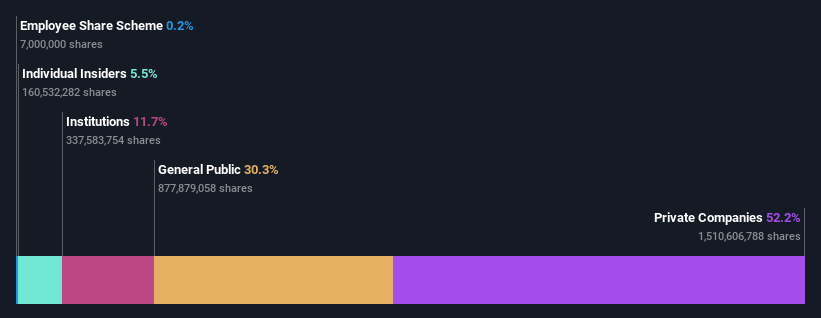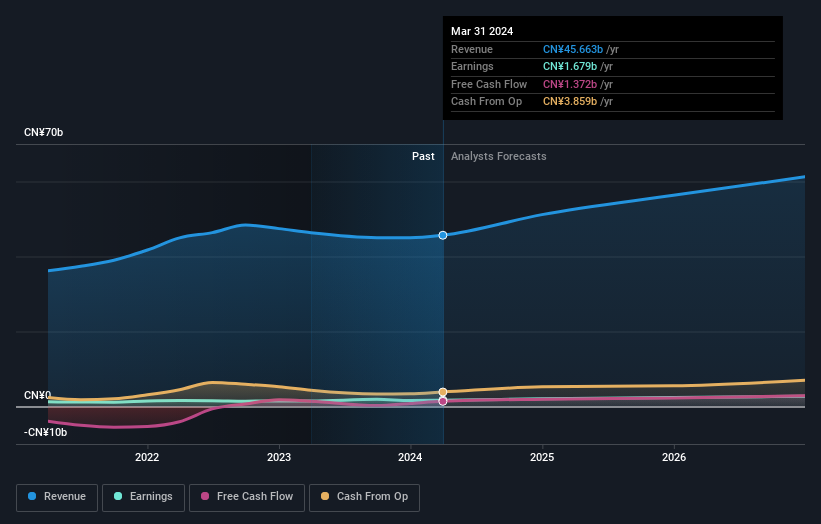While individual investors own 30% of YUNDA Holding Co., Ltd. (SZSE:002120), private companies are its largest shareholders with 52% ownership

Key Insights
- The considerable ownership by private companies in YUNDA Holding indicates that they collectively have a greater say in management and business strategy
- 52% of the company is held by a single shareholder (Shanghai Luojiesi Investment Management Co., Ltd.)
- Institutions own 12% of YUNDA Holding
To get a sense of who is truly in control of YUNDA Holding Co., Ltd. (SZSE:002120), it is important to understand the ownership structure of the business. The group holding the most number of shares in the company, around 52% to be precise, is private companies. In other words, the group stands to gain the most (or lose the most) from their investment into the company.
Meanwhile, individual investors make up 30% of the company’s shareholders.
Let's take a closer look to see what the different types of shareholders can tell us about YUNDA Holding.
See our latest analysis for YUNDA Holding

What Does The Institutional Ownership Tell Us About YUNDA Holding?
Many institutions measure their performance against an index that approximates the local market. So they usually pay more attention to companies that are included in major indices.
We can see that YUNDA Holding does have institutional investors; and they hold a good portion of the company's stock. This implies the analysts working for those institutions have looked at the stock and they like it. But just like anyone else, they could be wrong. When multiple institutions own a stock, there's always a risk that they are in a 'crowded trade'. When such a trade goes wrong, multiple parties may compete to sell stock fast. This risk is higher in a company without a history of growth. You can see YUNDA Holding's historic earnings and revenue below, but keep in mind there's always more to the story.

Hedge funds don't have many shares in YUNDA Holding. Looking at our data, we can see that the largest shareholder is Shanghai Luojiesi Investment Management Co., Ltd. with 52% of shares outstanding. With such a huge stake in the ownership, we infer that they have significant control of the future of the company. Teng Yun Nie is the second largest shareholder owning 2.8% of common stock, and AEGON-Industrial Fund Management Co. Ltd. holds about 2.0% of the company stock.
While studying institutional ownership for a company can add value to your research, it is also a good practice to research analyst recommendations to get a deeper understand of a stock's expected performance. Quite a few analysts cover the stock, so you could look into forecast growth quite easily.
Insider Ownership Of YUNDA Holding
The definition of an insider can differ slightly between different countries, but members of the board of directors always count. The company management answer to the board and the latter should represent the interests of shareholders. Notably, sometimes top-level managers are on the board themselves.
Most consider insider ownership a positive because it can indicate the board is well aligned with other shareholders. However, on some occasions too much power is concentrated within this group.
We can see that insiders own shares in YUNDA Holding Co., Ltd.. This is a big company, so it is good to see this level of alignment. Insiders own CN¥1.1b worth of shares (at current prices). If you would like to explore the question of insider alignment, you can click here to see if insiders have been buying or selling.
General Public Ownership
The general public-- including retail investors -- own 30% stake in the company, and hence can't easily be ignored. This size of ownership, while considerable, may not be enough to change company policy if the decision is not in sync with other large shareholders.
Private Company Ownership
Our data indicates that Private Companies hold 52%, of the company's shares. It's hard to draw any conclusions from this fact alone, so its worth looking into who owns those private companies. Sometimes insiders or other related parties have an interest in shares in a public company through a separate private company.
Next Steps:
While it is well worth considering the different groups that own a company, there are other factors that are even more important. Be aware that YUNDA Holding is showing 1 warning sign in our investment analysis , you should know about...
But ultimately it is the future, not the past, that will determine how well the owners of this business will do. Therefore we think it advisable to take a look at this free report showing whether analysts are predicting a brighter future.
NB: Figures in this article are calculated using data from the last twelve months, which refer to the 12-month period ending on the last date of the month the financial statement is dated. This may not be consistent with full year annual report figures.
New: Manage All Your Stock Portfolios in One Place
We've created the ultimate portfolio companion for stock investors, and it's free.
• Connect an unlimited number of Portfolios and see your total in one currency
• Be alerted to new Warning Signs or Risks via email or mobile
• Track the Fair Value of your stocks
Have feedback on this article? Concerned about the content? Get in touch with us directly. Alternatively, email editorial-team (at) simplywallst.com.
This article by Simply Wall St is general in nature. We provide commentary based on historical data and analyst forecasts only using an unbiased methodology and our articles are not intended to be financial advice. It does not constitute a recommendation to buy or sell any stock, and does not take account of your objectives, or your financial situation. We aim to bring you long-term focused analysis driven by fundamental data. Note that our analysis may not factor in the latest price-sensitive company announcements or qualitative material. Simply Wall St has no position in any stocks mentioned.
Have feedback on this article? Concerned about the content? Get in touch with us directly. Alternatively, email editorial-team@simplywallst.com
About SZSE:002120
Undervalued with excellent balance sheet.

